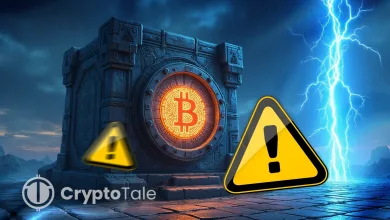CoinDCX Denies Acquisition Rumors Amid Coinbase’s India Push

- CoinDCX denies reports of Coinbase acquisition talks amid post-hack recovery efforts.
- The Indian exchange confirms focus on growth despite $44M hack linked to the Lazarus Group.
- CoinDCX launches bounty program to recover funds, offering up to $11M for successful leads.
India’s CoinDCX is denying rumors of a buyout as it works to rebuild trust following a $44 million hack. Recent media reports suggested Coinbase was nearing a deal to acquire CoinDCX at a valuation under $1 billion. But CoinDCX CEO Sumit Gupta called the claims inaccurate.
On X, Gupta said, “Ignore the rumours! CoinDCX is super focused on building for India’s crypto story and not up for sale.” The denial came just after an Indian news outlet reported Coinbase was in advanced acquisition talks. Sources claimed the deal would value CoinDCX at around $900 million, less than half its 2021 peak of $2.2 billion.
Coinbase Eyes Indian Market Re-Entry
Coinbase has expressed enthusiasm to revive its services in India’s crypto space after shutting down operations in 2022. Despite the shutdown, Coinbase continued engaging with Indian exchanges. It holds stakes in both CoinDCX and rival CoinSwitch. The exchange also secured registration with India’s Financial Intelligence Unit (FIU) in March, clearing a major regulatory hurdle.
Coinbase said it is actively exploring global partnerships and investment opportunities to support its long-term roadmap. However, the company declined to confirm whether talks with CoinDCX were ongoing. “We continuously explore opportunities to build, buy, partner, and invest,” a Coinbase spokesperson said. “But we have no comment on any acquisition rumors.”
CoinSwitch co-founder Ashish Singhal also confirmed there were no active conversations regarding a merger of stakes with CoinDCX. Still, insiders noted such a move remains “likely” as Coinbase positions itself for deeper market access in India.
CoinDCX Recovers from $44M Hack
Meanwhile, CoinDCX is focused on post-hack recovery efforts. On July 19, the platform suffered a $44 million crypto theft through one of its internal liquidity accounts. The company immediately froze the affected wallet and said customer funds were not compromised.
Cybersecurity researchers linked the exploit to the North Korean Lazarus Group, known for several high-profile crypto heists. The pattern resembled the WazirX attack last year, which caused losses of $234 million.
In response, CoinDCX launched a recovery bounty program to track the stolen funds. The platform has pledged up to 25% of any recovered amount, up to $11 million for successful leads. CoinDCX also promised to implement stricter internal protocols and improve wallet security.
Related: North Korea Targets Indian Crypto Professionals with Malware
At the time of reporting, CoinDCX held around $160 million in total assets. Daily spot trading volume was approximately $13.5 million. The exchange ranked 143rd among centralized platforms on CoinMarketCap.
Despite the setback, CoinDCX leadership insists the company remains committed to long-term growth. “We’re not selling,” Gupta said, repeating that CoinDCX is fully focused on expanding India’s crypto ecosystem.
Although the rumors regarding the acquisition have not been proven, it reflects the overall competition in India’s digital assets market. It is evident that Coinbase is interested in re-establishing itself locally, and acquiring an exchange like CoinDCX could offer fast-track access.
For now, CoinDCX continues building independently while addressing damage from the recent hack. Whether Coinbase moves forward with other acquisition targets or waits for India’s crypto rules to evolve remains to be seen.




